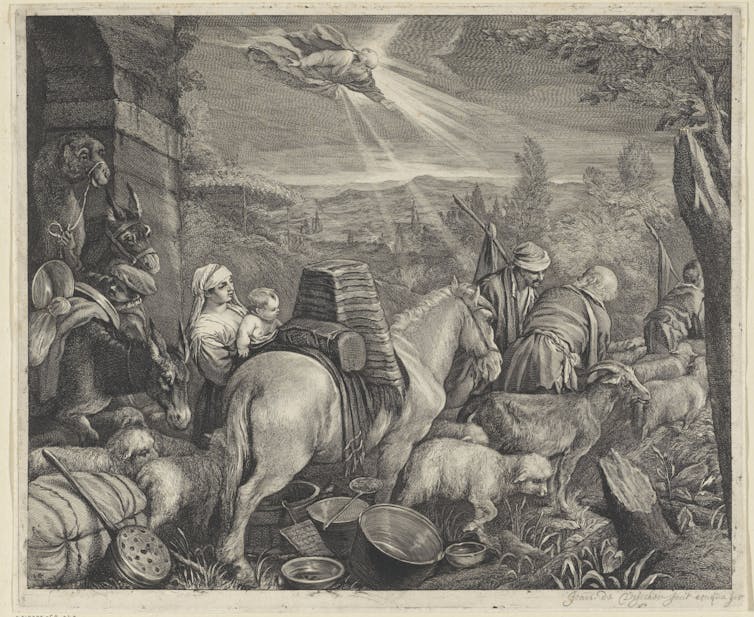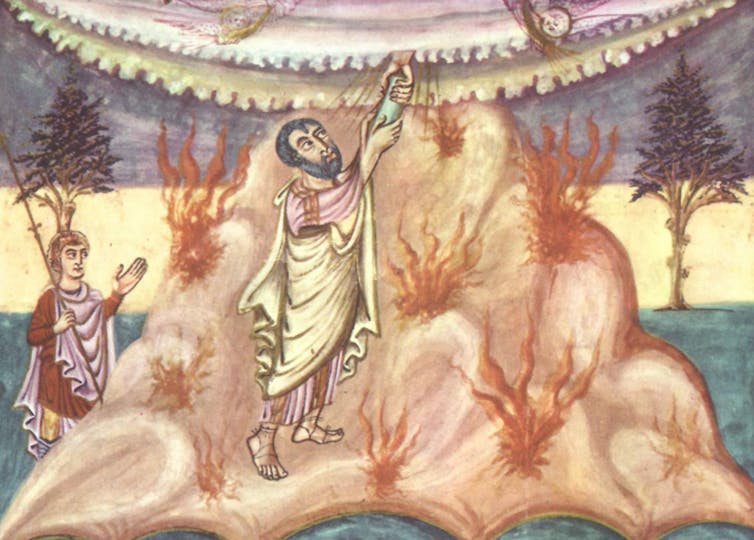In current US politics, a “biblical” view of the Middle East informs foreign policy – perhaps more than it has for decades. This makes it very important to understand what the Bible actually says, particularly about the idea of a “promised land”.
Biblical scholars and historians like me often observe that the Bible does not provide a full, holistic history. It shines the torch on certain events and memories, for particular purposes. It tells of origins, laws, ethics, divine revelations and a nation’s relationship with God.
It does not speak with one voice, but with many voices from different times and places in a collection of books. The Hebrew Bible, or Old Testament, was finalised largely from the eighth century BC to the second century BC, and the Christian Bible added literature of the 1st century AD in the form of the New Testament.
The Bible doesn’t always speak plainly, either, and has been translated and interpreted in different ways. The Bible has a lot to say about land, but there isn’t a single clear message throughout. Instead, there are various agreements made between God and different men (it’s a patriarchal world) about where certain people should live.
In the Book of Genesis, God promises a wandering herder named Abraham that he will be “the father of many nations” stretching from the Nile to the Euphrates, as long as these different Abrahamic nations keep a covenant of faithfulness (symbolised by male circumcision).

To a herder, this is about the right to move around with flocks. Nothing is said of Abraham destroying existing cities or evicting people, though he might form alliances and fight if his close family is attacked. He also makes agreements with rulers. On this biblical view, there is room for different people to live together in the same region. It is a patchwork.
Abraham’s sons Ishmael and Isaac go on to inherit key promises (as herders). This breaks down as follows: Isaac’s portion is the “Land of Canaan”, and Ishmael’s “east of Egypt as one goes to Assyria”. Canaan roughly corresponds to the area of modern-day Israel, northwestern Jordan and the Occupied Palestinian Territories. The area was also known as “Palestine” from at least the fifth century BC.
Isaac has two sons, Esau and Jacob. Jacob is promised Canaan, while Esau goes to Edom, a region spanning present-day southwestern Jordan and (in due course) southern Israel.
Jacob, renamed Israel, has 12 sons – the founders of the 12 tribes of Israel, or Israelites. They then also inherit the promise to settle (with families and herds) in Canaan. Among these tribes is the tribe of Judah – the Judahites (Jews).
From the books of Exodus to Deuteronomy, however, the Israelites are no longer herders. Enslaved in Egypt, they escape, under the leadership of the prophet Moses. In Deuteronomy, God promises the Israelites possession of land on condition of obedience to his commandments: “But if your heart turns away and you are not obedient … I declare to you this day that you will certainly be destroyed. You will not live long in the land.” It is an ominous note.

On this biblical view, holding land is correlated with the Israelites’ obedience to the laws. To give a pertinent example – Leviticus 19:33-34: “When a foreigner lives among you in your land, do not mistreat them. The foreigner living among you must be treated as your home-born. Love them as yourself, for you were foreigners in the land of Egypt.”
In the Book of Joshua, the Israelites take possession of parts of Canaan by means of conquest, mass slaughter and destruction common in ancient warfare, but totally at variance with today’s laws of war. The 12 tribes of Israel then notionally divide the territory (conquered and unconquered) between them. Judah’s territory is around Jerusalem and to the south.
However, already in the next book, Judges, the Israelites are actually only one of several peoples living in the area, and are not even entirely united. On this biblical view, the land is still a patchwork.
In the books of the prophets (Amos, Hosea, Isaiah, Jeremiah, Ezekiel and others), Israelites are continually berated for failing in ethical matters, and warned of dire consequences. The theme remains that the promise is conditional, and Israel is failing to keep the law.
The biblical story arc
The Book of Joshua is actually the starting point of a story that tells of continual wars and – apart from some grand successes – a downhill slide into territorial loss. There is a slow, painful working out of God’s disappointment, as God allows other local peoples and foreign nations to take back territory the Israelites seized, until it is nearly all gone. The Jews are taken into exile in Babylon.
In the books of Ezra and Nehemiah, the Jews retake possession of their former temple city of Jerusalem and its surrounding region. A biblical view based on those accounts would be that Judah restores and settles peaceably in that area, but claims nowhere else.
Other Israelite tribes were largely gone, apart from a pocket in Samaria. There was yet hope for tribal restoration. In Ezekiel, it is predicted that God would eventually see off oppressive empires and re-enliven the 12 tribes of Israel in a region the prophet called “the land of Israel”, under the rule of a Jewish king: the Messiah (Ezekiel 37:22 and 24). On this biblical view, only the Messiah can lead a miraculously reconstituted Israel to the land.
And a big question is, on this view of restoration: who even represents Israel? This takes us beyond the Hebrew Bible to later times.
Adding to the story
In the 2nd century BC, Jewish priest-kings in Judah, which had become known as Judaea, started to conquer neighbours, including other remaining Israelites. Jews settled in conquered territories and some other inhabitants – the now culturally Greek Palestinians – converted.
For the priest-kings, Jews were the only true representatives of all the tribes of Israel, exclusively inheriting the promise. Their rule lasted just over a century. But that story is not in the Bible.
Then came Christianity. In the fourth century AD, Christianity became the religion of Roman emperors, and they took a special interest in Palestine. For Christians, following Jesus as the Messiah, they had become the heirs of God’s promise. Jewish claims were superseded.
Thus we later get the Byzantine empire’s provinces of Palestine, the concept of the Holy Land and the Crusades. All this was justified by interpretations of certain passages of the Bible.
Despite the varied and nuanced concepts of how to settle in “the promised land” found throughout the Bible, it is the Book of Joshua’s divisions that provide some people today with a model for a “biblical” territorial claim. But this is combined with the non-biblical assertion that Jews alone have inherited the promise.
Joshua has become a paradigm for extremist Zionist settler claims and even aspects of the Israeli army, as American Bible scholar Rachel Havrelock has explored. The Book of Joshua is lifted out of the total story arc of the Bible.
And if we move beyond the Bible there is so much other history in this region to remember. People converted and married as well as fought each other. Later on, Jews could become Christians, Christians could become Muslims – and all peoples could become Arabs (with Arabisation and cultural transition in the 7th-9th centuries).
People could flee or be evicted, but keep their identities and traditions and return. The return of Jewish people to the land has been momentous in terms of Jewish national life. But the Palestinians, too, are the descendants of the people of old, from the places of old.
The Bible’s narrative concerns God’s love for Israel, but the land is a patchwork. After all, as Abraham was told, through him “all the families of the earth will be blessed”.
Joan Taylor has received funding from the Commonwealth scholarships and Fulbright schemes, the Wellcome Trust, Leverhulme and various academic societies. In terms of religious faith she is a Quaker.
This article was originally published on The Conversation. Read the original article.







